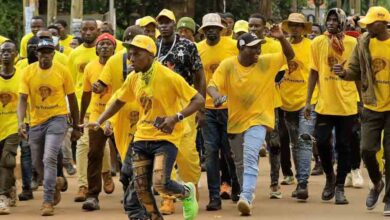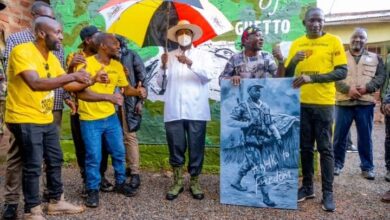Former Police Commander Sam Omara Dies at Mulago Hospital Amid Legacy of Controversy

– Retired Assistant Commissioner of Police (ACP) Sam Omara, a polarizing figure known for his role in quelling the 2011 Walk to Work protests led by opposition leader Dr. Kizza Besigye, passed away this morning at Mulago National Referral Hospital. Omara, aged 65, succumbed to complications from prostate cancer and kidney failure, for which he had been undergoing dialysis, according to posts on X and local media reports. His death has sparked mixed reactions, reigniting debates about his tenure and the state of Uganda’s healthcare system.
A Career Defined by Confrontation
Sam Omara rose to prominence as the Kampala Field Force Commander during the turbulent Walk to Work protests in 2011, a movement spearheaded by Dr. Kizza Besigye, then-president of the Forum for Democratic Change (FDC). The protests, aimed at highlighting soaring fuel and food prices, saw violent clashes between security forces and demonstrators. Omara’s aggressive tactics, including the use of tear gas, live ammunition, and mass arrests, earned him both notoriety and recognition within Uganda’s security apparatus. A post by @SpiceFMHoima on X noted that Omara “made a name for quelling the 2011 Walk to Work protests,” a sentiment echoed across social media.
During the protests, Besigye himself faced multiple arrests, with one particularly brutal incident on April 28, 2011, at Mulago Roundabout, where police, under Omara’s command, smashed Besigye’s car windscreen and doused him with pepper spray, temporarily impairing his vision. Besigye’s sister, Dr. Olive Kobusinye, reported at the time that he struggled to breathe and required specialist attention. The violence resulted in at least two deaths and over 100 injuries, with 78 people treated at Mulago Hospital, 10 for gunshot wounds, according to Red Cross official Richard Nataka.
Omara’s actions during this period were widely criticized by human rights groups and opposition supporters, who accused him of excessive force. A post by @patrickMalala9 on X described Omara as a “victim of the same broken system he once served,” highlighting the irony of his death in a hospital allegedly lacking adequate resources. However, government supporters viewed Omara as a loyal officer who maintained order during a volatile time.
Health Struggles and Death
Omara had been battling serious health issues for over a year, including prostate cancer and kidney failure. According to a post by @voice_of_teso, he underwent dialysis at Mulago Hospital in 2024 but succumbed to his ailments at 7:00 AM on April 28, 2025. Earlier in the day, police spokesperson Kituuma Rusoke refuted premature social media reports of Omara’s death, only for confirmation to follow hours later.
The circumstances of Omara’s death have drawn attention to Uganda’s strained healthcare system. Mulago, the country’s flagship referral hospital, has faced criticism for inadequate facilities and medication shortages. A post by @parrotsug noted that Omara’s prolonged battle with illness underscored systemic failures, stating he died “at Mulago hospital for a long time.” Opposition figures, including Besigye, have previously criticized Mulago’s conditions, with Besigye himself lamenting the hospital’s neglect of patients, such as his childhood friend Gaudy Kemigisha in 2022.
Mixed Legacy and Public Reaction
Omara’s death has elicited a spectrum of responses. For some, he was a dedicated officer who served Uganda’s security interests during a challenging period. Others, particularly opposition supporters, remember him as a symbol of state repression. A post by @sabasabaupdates linked Omara’s legacy to the Walk to Work protests, noting his role in operations against Besigye. Another user, @tken9914, described him as a “renowned” commander whose confrontations with Besigye defined his career.
The timing of Omara’s death coincides with heightened political tensions in Uganda, as opposition groups, including Besigye’s People’s Front for Freedom (PFF) and Robert Kyagulanyi’s National Unity Platform (NUP), face ongoing state restrictions. Besigye, recently charged with treason following his abduction in Kenya in November 2024, remains a focal point of opposition activity. The NUP’s planned youth rally, blocked by police, and the alleged abduction of Kyagulanyi’s bodyguard, Eddie Mutwe, have further fueled accusations of government overreach. Omara’s death, therefore, serves as a reminder of the fraught relationship between Uganda’s security forces and opposition movements.
Political and Social Implications
Critics have seized on Omara’s death to highlight perceived government hypocrisy. @patrickMalala9’s post suggested that the state might allocate “billions” for Omara’s state burial while neglecting healthcare funding, reflecting public frustration with resource mismanagement. Meanwhile, opposition leaders like Besigye, who once worked at Mulago as a physician, have long argued that systemic neglect of public services, including healthcare, fuels unrest.
The Walk to Work protests, during which Omara gained prominence, were a turning point for Besigye’s political career, revitalizing his influence after electoral losses to President Yoweri Museveni. Omara’s role in suppressing these protests cemented his reputation as a hardliner, but his death in a struggling hospital has led some to question the system he defended. As one X user remarked, “The regime will pretend to honor him after abandoning him.”







